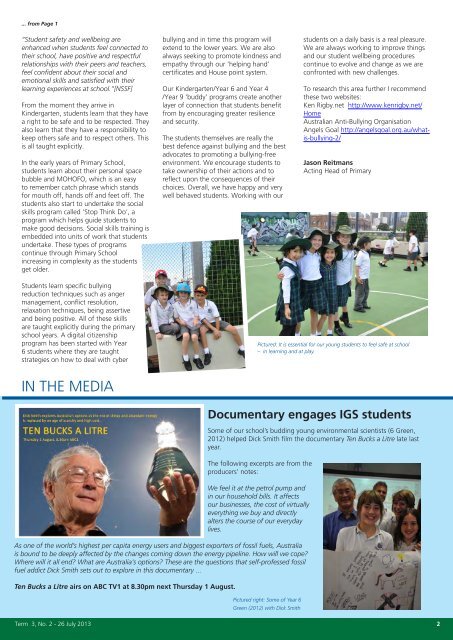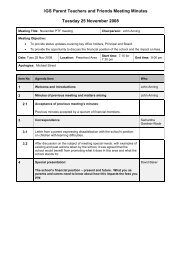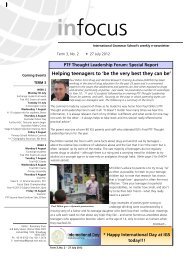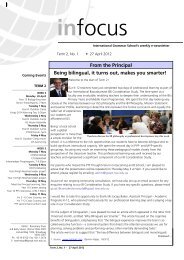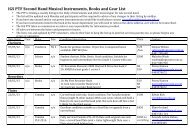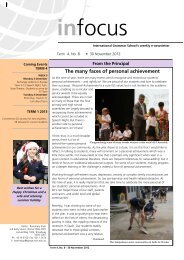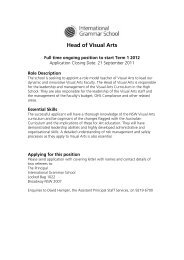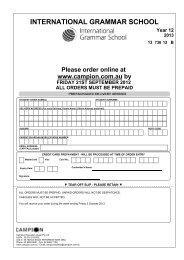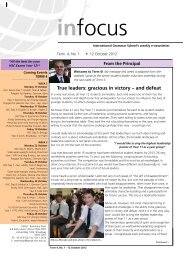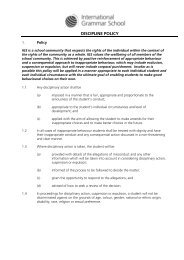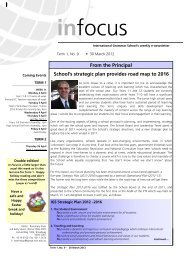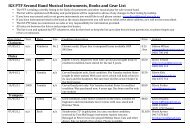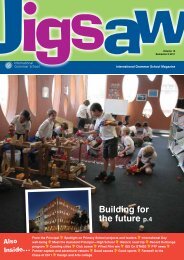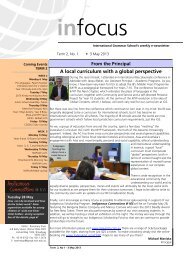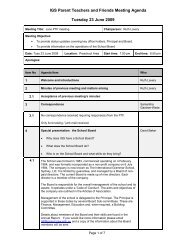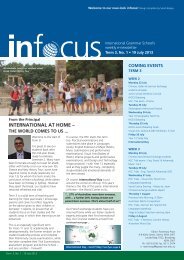No.2 - 26 July 2013 - International Grammar School
No.2 - 26 July 2013 - International Grammar School
No.2 - 26 July 2013 - International Grammar School
- No tags were found...
Create successful ePaper yourself
Turn your PDF publications into a flip-book with our unique Google optimized e-Paper software.
... from Page 1“Student safety and wellbeing areenhanced when students feel connected totheir school, have positive and respectfulrelationships with their peers and teachers,feel confident about their social andemotional skills and satisfied with theirlearning experiences at school.”[NSSF]From the moment they arrive inKindergarten, students learn that they havea right to be safe and to be respected. Theyalso learn that they have a responsibility tokeep others safe and to respect others. Thisis all taught explicitly.In the early years of Primary <strong>School</strong>,students learn about their personal spacebubble and MOHOFO, which is an easyto remember catch phrase which standsfor mouth off, hands off and feet off. Thestudents also start to undertake the socialskills program called ‘Stop Think Do’, aprogram which helps guide students tomake good decisions. Social skills training isembedded into units of work that studentsundertake. These types of programscontinue through Primary <strong>School</strong>increasing in complexity as the studentsget older.bullying and in time this program willextend to the lower years. We are alsoalways seeking to promote kindness andempathy through our ‘helping hand’certificates and House point system.Our Kindergarten/Year 6 and Year 4/Year 9 ‘buddy’ programs create anotherlayer of connection that students benefitfrom by encouraging greater resilienceand security.The students themselves are really thebest defence against bullying and the bestadvocates to promoting a bullying-freeenvironment. We encourage students totake ownership of their actions and toreflect upon the consequences of theirchoices. Overall, we have happy and verywell behaved students. Working with ourstudents on a daily basis is a real pleasure.We are always working to improve thingsand our student wellbeing procedurescontinue to evolve and change as we areconfronted with new challenges.To research this area further I recommendthese two websites:Ken Rigby.net http://www.kenrigby.net/HomeAustralian Anti-Bullying OrganisationAngels Goal http://angelsgoal.org.au/whatis-bullying-2/Jason ReitmansActing Head of PrimaryStudents learn specific bullyingreduction techniques such as angermanagement, conflict resolution,relaxation techniques, being assertiveand being positive. All of these skillsare taught explicitly during the primaryschool years. A digital citizenshipprogram has been started with Year6 students where they are taughtstrategies on how to deal with cyberPictured: It is essential for our young students to feel safe at school– in learning and at play.IN THE MEDIADocumentary engages IGS studentsSome of our school’s budding young environmental scientists (6 Green,2012) helped Dick Smith film the documentary Ten Bucks a Litre late lastyear.The following excerpts are from theproducers’ notes:We feel it at the petrol pump andin our household bills. It affectsour businesses, the cost of virtuallyeverything we buy and directlyalters the course of our everydaylives.As one of the world’s highest per capita energy users and biggest exporters of fossil fuels, Australiais bound to be deeply affected by the changes coming down the energy pipeline. How will we cope?Where will it all end? What are Australia’s options? These are the questions that self‐professed fossilfuel addict Dick Smith sets out to explore in this documentary ...Ten Bucks a Litre airs on ABC TV1 at 8.30pm next Thursday 1 August.Pictured right: Some of Year 6Green (2012) with Dick SmithTerm 3, No. 2 - <strong>26</strong> <strong>July</strong> <strong>2013</strong> 2


